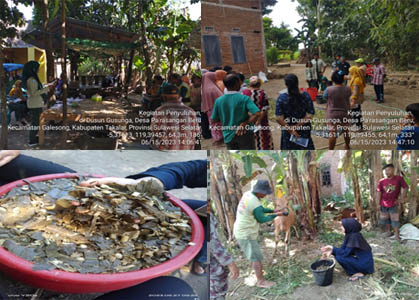Pembuatan pakan fermentasi limbah jagung dengan penambahan probiotik effective microorganisms 4 (EM4)
Making corn waste fermented feed with the addition of effective microorganisms 4 (EM4)
DOI:
https://doi.org/10.46549/igkojei.v4i3.417Keywords:
Fermentation, Feed, Corn waste, Probiotic supplements, Fermentasi, Limbah jagung, Pakan, Suplemen probiotikAbstract
ABSTRACT
Feed is material that can be eaten, digested and absorbed either in whole or in part and does not cause poisoning or does not interfere with the health of livestock that consume it. Corn plant waste is the entire corn plant including stalks, leaves and young corn which are generally harvested at the age of 65-75 days. Fermentation of feed is a way of processing animal feed through an ammonia process to maintain the nutritional content in animal feed such as forage which can last for a longer time without reducing the nutrient content contained in the feed. Fermented feed production lasts for 14 days using probiotic supplements (EM4) and molasses. The purpose of this counseling is to find out the level of knowledge of farmers/breeders about making fermented corn plant waste feed. The methods used in this counseling are lectures, discussions, and demonstrations using a group approach. The increase in knowledge owned by farmers is quite significant and the effectiveness of increasing farmer knowledge (EPP) is included in the criteria of being quite effective.
Keywords: Corn waste; Fermentation; Feed; Probiotic supplements
ABSTRAK
Pakan adalah bahan yang dapat dimakan, dicerna dan diserap baik secara keseluruhan atau sebagian dan tidak menimbulkan keracunan atau tidak mengganggu kesehatan ternak yang mengkonsumsinya. Limbah tanaman jagung adalah seluruh tanaman jagung termasuk batang, daun, dan buah jagung muda yang umumnya dipanen pada umur tanaman 65-75 hari. Fermentasi pakan merupakan satu cara pengolahan pakan ternak yang melalui proses amoniasi untuk menjaga kandungan nutrisi dalam pakan ternak seperti hijauan yang dapat bertahan dalam waktu yang lebih lama tanpa mengurangi kandungan nutrisi yang terdapat dalam pakan. Pembuatan pakan fermentasi berlangsung selama 14 hari menggunakan suplemen probiotik (EM4) dan molasses. Tujuan dilakukannya penyuluhan ini yaitu untuk mengetahui tingkat pengetahuan petani/peternak tentang pembuatan pakan fermentasi limbah tanaman jagung. Metode yang digunakan dalam penyuluhan ini adalah ceramah, diskusi, dan demostrasi cara dengan pendekatan secara berkelompok. Peningkatan pengetahuan yang dimiliki petani cukup signifikan dan efektifitas peningkatan pengetahuan petani (EPP) masuk kedalam kriteria cukup efektif.
Kata kunci: Fermentasi; Limbah jagung; Pakan; Suplemen probiotik
Downloads
References
Anwarudin, O., Fitriana, L., Defriyanti, W.T., Permatasari, P., Rusdiyana, E., Zain, K.M., Jannah, E.N., Sugiarto, M., Nurlina, & Haryanto, Y. (2021). Sistem Penyuluhan Pertanian. Yayasan Kita Menulis.
Ataribaba, Y., Peten, S. P., & Mual C. D. (2021). Pengaruh Pupuk Hayati Terhadap Pertumbuhan Tanaman Sawi (Brassica juncea L.) di Kamapung Sidomulyo, Distrik Oransbari, Kabupaten Manokwari Selatan, Provinsi Papua Barat, Vol 12 (2) : 66- 78.
Ginting. (1991). Metode Kuliah Kerja Lapangan. Malang (Indonesia): Universitas Brawijaya.
Kartasapoetra GA. (1988). Teknologi Penyuluhan Pertanian. Jakarta (Indonesia): Bina Aksara.
Reksohadiprodjo, S. 1994. Produksi Tanaman Hijauan Makanan Ternak Tropik. B.P.F.E. University Gadjah Mada, Yogyakarta.
Undang-undang nomor 16 tahun 2006 tentang Sistem Penyuluhan Pertanian, Perikanan dan Kehutanan (UU-SP3K).

Downloads
Published
How to Cite
Issue
Section
License
Copyright (c) 2023 Wulan Ade Irma Ningsih, Wulan A. I. Ningsih, Muh. Tahir

This work is licensed under a Creative Commons Attribution-NonCommercial-ShareAlike 4.0 International License.
License and Copyright Agreement
In submitting the manuscript to the journal, the authors certify that:
- They are authorized by their co-authors to enter into these arrangements.
- The work described has not been formally published before, except in the form of an abstract or as part of a published lecture, review, thesis, or overlay journal. Please also carefully read IGKOJEI: Jurnal Pengabdian Masyarakat Posting Your Article Policy at https://journal.fapetunipa.ac.id/index.php/igkojei/policy/publicationethics
- That it is not under consideration for publication elsewhere,
- That its publication has been approved by all the author(s) and by the responsible authorities – tacitly or explicitly – of the institutes where the work has been carried out.
- They secure the right to reproduce any material that has already been published or copyrighted elsewhere.
- They agree to the following license and copyright agreement.
Copyright
Authors who publish withIGKOJEI: Jurnal Pengabdian Masyarakat agree to the following terms:
- Authors retain copyright and grant the journal right of first publication with the work simultaneously licensed under a Creative Commons Attribution License (CC BY-NC-SA 4.0) that allows others to share the work with an acknowledgment of the work's authorship and initial publication in this journal.
- Authors are able to enter into separate, additional contractual arrangements for the non-exclusive distribution of the journal's published version of the work (e.g., post it to an institutional repository or publish it in a book), with an acknowledgment of its initial publication in this journal.
- Authors are permitted and encouraged to post their work online (e.g., in institutional repositories or on their website) prior to and during the submission process, as it can lead to productive exchanges, as well as earlier and greater citation of published work.

This work is licensed under a Creative Commons Attribution-NonCommercial-ShareAlike 4.0 International License.






